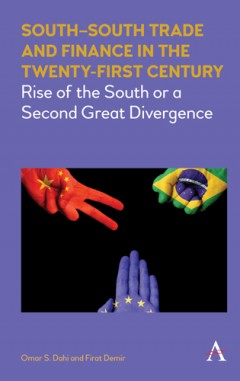South–South Trade and Finance in the Twenty-First Century
Rise of the South or a Second Great Divergence
By Omar Dahi & Firat Demir
- About This Book
- Reviews
- Author Information
- Series
- Table of Contents
- Links
- Podcasts
About This Book
This book is a contribution to the international trade and economic development literature and is based on a decade of joint research and collaboration on South–South economic relations. Given the increasing focus on the economic power of some developing countries, for example the 2013 Human Development Report’s “Rise of the South”, it is particularly appropriate and timely. [NP] The book’s findings are based on rigorous empirical examination of South–South trade and finance and it provides an even-handed assessment from the perspective of long-term development goals rather than mainstream welfare approaches or ideological/theoretical worldview. [NP] This work directly engages with the ‘new developmentalism’ literature that has challenged the neoliberal orthodoxy and its policy approach, which focuses on liberalization, privatization, and deregulation. It also engages with literature by examining whether the increase in South–South trade facilitates or inhibits the possibilities for developmentalist economic policy in developing countries. The book shows concrete and positive results from South–South trade particularly related to industrial development and also documents how South–South trade is dominated by large developing countries and that South–South trade liberalization may be counterproductive.
Reviews
“South–South cooperation was once viewed as a major component of an alternative and more equitable route to development for the marginalized countries of the global economy facing the inequities of North–South economic relations. With the rise of the emerging South, a large group of semi-industrial or newly industrialized countries in the global economy, does this promise still hold? Or will the widening of economic disparities within the global South continue and result in a second great divergence, this time between the emerging South and the rest of the South? In this book, Omar Dahi and Firat Demir address these fundamental questions through what is probably the most comprehensive and deep analysis to date of the past and present as well as the likely and desirable futures of South–South economic relations.”
—Jaime Ros, Professor of Economics, The National Autonomous University of Mexico, and Professor Emeritus of Economics and Faculty Fellow of the Kellogg Institute for International Studies, University of Notre Dame, USA
“This book unpacks the glib assumptions made by standard discussions of ‘South–South co-operation’ to reveal a much more complex, nuanced and uneven dynamic process in which power relationships and political economy considerations matter crucially. The economic rise of some countries has both positive and negative implications for other countries of the global South. How to make the outcomes more mutually beneficial is the critical question that the authors explore. Important reading for anyone who wants to understand current global economic realities.” —Jayati Ghosh, Professor of Economics, Jawaharlal Nehru University, India
“Omar Dahi and Fırat Demir have produced a first-rate study of the constraints and possibilities of trade and finance for the global South. Nose-to-the-figures technical knowledge is combined with smart analytical work to deliver one of the best—and most readable—accounts of maldevelopment in our times. This is the kind of book that, I hope, would resuscitate development economics. Given that the authors predict the opening up of a second great divergence, and that they have proposals to prevent it, this book is—for billions of people—a matter of life and death.” —Vijay Prashad, author of The Poorer Nations: A Possible History of the Global South
Author Information
Omar S. Dahi is associate professor of economics at Hampshire College. Specializing in economic development and international trade, Dahi has published in various journals including Journal of Development Economics, Applied Economics, Southern Economic Journal, Middle East Report and Forced Migration Review.
Fırat Demir is associate professor of economics at the University of Oklahoma. Specializing in economic development and open economy macroeconomics, Demir has published in various journals including Development and Change, Journal of Development Economics, Journal of Development Studies, Review of Radical Political Economics, Southern Economic Journal and World Development. He was a Fulbright Fellow in Montenegro in 2015-2016.
Series
Table of Contents
Chapter 1: Introduction to South-South Relations; Chapter 2: South-South Relations in Their Historical Context; Chapter 3: Theoretical frameworks and emerging trends; Chapter 4: Empirical Analysis of the Structure of Trade and Finance; Chapter 5: Stopping a Second Great Divergence: A New Framework For South-South Relations; Chapter 6: Concluding Thoughts.
Links
Stay Updated
Information
Latest Tweets



